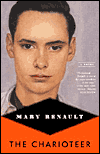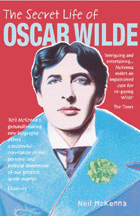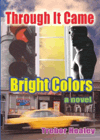"My First Gay Novel" —Tony Heyes The Charioteer by Mary Renault Vintage Books First published 1957 ISBN: 0-375-71418-9 Marilyn Monroe was still alive when, naive almost to the point of imbecility, I started work as an office boy in our local Town Hall. Among my many onerous duties (administering the tea fund, keeping the stationery cupboard tidy, going to the pasty shop) was sauntering forth every day at 4.15 p.m. to get the local evening newspaper for my boss. One sunlit afternoon my attention was riveted by a banner headline: “SEX PERVERTS’ VICE RING IN COURT”. With eyes standing out like chapel hat-pegs, I stood on the Town Hall Square and read the whole article as the traffic whizzed past. The “vice ring”, it transpired, was a group of gay men who had been rounded up by the police after they had trawled through the address book of one of them. Their only crime was to have known one another with a degree of intimacy then illegal. One police witness confessed to being shocked and revolted when one of the “perverts” said of his partner that he loved him as the policeman no doubt loved his wife. Most of the men involved worked in administration or nursing at the local hospital; none was in any meaningful sense “vicious”. All were convicted of varying degrees of indecency and several got prison sentences. This type of newspaper article served more than anything else to reinforce the feeling of paranoia and (not to put it any more strongly) self-doubt with which gay men lived at that time. There had been several similar, more celebrated cases reported nationally throughout the nineteen-fifties and there were to be more in the early sixties. So it was something of a relief and a revelation to come across Mary Renault’s novel The Charioteer which had been published a few years before. For the first time it was possible to read of a gay man who did not feel himself to be morally deformed or the spawn of Satan. This was Miss Renault’s sixth novel and her last contemporary one. Thereafter she would write historical novels set in ancient Greece, a time and place she clearly felt was more congenial. Publishing The Charioteer at that time was a brave and pioneering thing to do. It is clear from the books that preceded it that Miss Renault was particularly interested in homosexuality, not surprising since she herself was a lesbian. Gayness is a theme that runs through most of her novels. The most notable aspect of them, however, is that it is treated as a given, not something that need be queried or agonised over. Having read all of her novels I would suggest that with The Charioteer she achieved maturity as a novelist. Each book was an improvement on the previous one and with this she found her true voice. The story is set in a military hospital, somewhere in England, during World War Two. Laurie Odell is a twenty-three year-old soldier who was badly wounded during the retreat from Dunkirk. Surgeons have succeeded in saving his leg by performing a series of operations over several months. Laurie feels like a fish out of water – he attended boarding school and comes from a very different walk of life from most of the other patients. What is more, he is gay. Miss Renault skilfully depicts the inadequacy of someone in his situation – the inappropriate responses, the inability to empathise, the agonising over saying the wrong thing; in short, the general feeling of alienation. Life alters irrevocably for Laurie when some conscientious objectors are drafted in as ward orderlies. He falls hopelessly in love with one of them, Andrew Raynes. Andrew is a very young Quaker and has agonised long and hard before becoming an objector. Their relationship develops slowly. Andrew seems to reciprocate Laurie’s feelings but Laurie is reluctant to declare himself, preferring to let events take their course. Into this situation comes Ralph Lanyon, whom Laurie idolised at school and who left under a cloud. He has had to leave his ship having lost several fingers in battle. He thought Laurie was dead, having been on the ship that brought him home when he was wounded and not expected to live, so their meeting at a gay party is a shock and surprise to him. Laurie attends the party only because he has heard Ralph’s name mentioned. They renew their friendship but then Ralph, a forceful, less complex character than Laurie, unwittingly messes up Laurie’s life and ruins any future he might have had with Andrew. Miss Renault describes beautifully and with great compassion the brittle campery of the fighter-pilots at the party, hyped up on Benzedrine, eating, drinking and making merry for they know that tomorrow they will die. At the same time she is unsparing in her implicit disapproval of those who see war as a licence to abandon all moral restraint and responsibility for others. Re-reading The Charioteer after so long a time one views it from a different perspective, whilst revisiting and reaffirming old conclusions. Her avoidance of the “F” word, substituting an “m” for the “f”, seems a bit twee now, but given that the language of Milton and Shakespeare is rapidly becoming the language of Sid Snot, her solution is perhaps preferable; not to have any profanity would be even better. Coarseness of words bespeaks coarseness of thought, and if that is elitist then sod it! I remember being devastated by the end of the novel. Laurie loses Andrew, ultimately, because of his own diffidence and respect for Andrew’s integrity. He is not prepared to force the issue and so is stuck with Ralph. Miss Renault herself said she was following Shaw’s Candida, Laurie opting for the one who couldn’t cope without him. She felt that Andrew and Laurie would eventually make up their differences but that Andrew would eventually die a martyr in some fever-stricken swamp or murdered by the Viet-Cong. The Charioteer is of its time and some of its social parameters seem odd now that homosexuality is no longer illegal. Even so, prejudice and persecution still remain and the lessons it taught about self-respect were valuable ones. Gay is what one is, not what one does. Gay people have the same rights as anyone else. That being so they cannot claim to be exceptions from the moral norm; the Categorical Imperative applies to them too. It was, if anything, more of a pleasure the second time round than the first. It remains a thought-provoking book whether you agree with its thesis or not. |
 The Secret Life of Oscar
Wilde The Secret Life of Oscar
Wildeby Neil McKenna Century 2003 ISBN 0 7126 6986 8 Lady Bracknell: “Never speak disrespectfully of Society, Algernon. Only people who can’t get into it do that”. Like "Hamlet," "The Importance of Being Earnest" is so full of quotations that most reasonably literate people feel that they know it off by heart. Consequently, it was with some trepidation that I approached a performance at Manchester’s Royal Exchange Theatre last month. Would I be able to watch the play or would I be too busy mentally reciting the famous lines along with the actors? Indeed, could I sit quietly or would I feel constrained to say aloud, with Lady Bracknell, “arise from that semi-recumbent posture! It is most indecorous”, or with Miss Prism, “The chapter on the Fall of the Rupee you may omit”? More importantly, could the actors infuse the time-worn lines with life or would they appear to be saying them by rote? In other words, had the play become so hackneyed that it was beyond redemption as a work of art? I needn’t have worried. After an initially shaky start – the younger actors having difficulty finding the appropriate speech rhythms – the play took flight and floated majestically to its gloriously absurd conclusion. As it was theatre in the round I was able to watch the reactions of members of the audience opposite, many of whom were either clearly not of Anglo-Saxon origin or too young to have seen the play before. They were captivated by the play’s absurdity and revelled in its exuberant lampooning of social norms among the late Victorian upper classes. It was Wilde at his fizzing best. Paradoxically, considering its perennial popularity, "The Importance of Being Earnest" gives clues to the reason for Wilde’s downfall. It is an outsider’s view of society that plays with the idea of living a double life, as did Wilde’s previous social comedies. In so doing it comes dangerously close to revealing Wilde’s own situation. Neil McKenna makes this clear in his new biography, The Secret Life of Oscar Wilde, which breaks new ground by not shirking what has previously been regarded as the seamier side of Wilde’s life. Few have bothered to investigate his pre-marital sexual activities or propensities. His involvement with young men has been seen as some sort of aberration that was subsequent to his marriage, possibly to the birth of his two sons. Mr. McKenna has no truck with this approach and has ranged widely in his search for contemporary evidence. Wilde, it is now clear, lived with a lover, Frank Miles, long before he met Constance Lloyd who was to become his wife. He seems, mentally, to have kept his life in various compartments, possibly to avoid facing the reality of his nature. It is apparent from various articles in newspapers and magazines of the time that Wilde was regarded as too precious by half and certainly effeminate. Not only that, he positively revelled in cocking a snook at accepted values and delighted in shocking and provoking. Discretion was not his middle name. The way in which the American press described him during his 1881 lecture tour of the U.S. was strikingly similar to the manner in which the British press was later to describe Liberace. Despite, or because of, this Wilde and his friends claimed that his marriage to Constance was a love match. Even so, his letters to her have an artificial air about them, and his description of her in a letter to a friend – “a grave, slight, violet-eyed Artemis, with great coils of heavy brown hair which make her flower-like head droop like a flower” – might have been penned by Niles Crane about Maris. Wilde was to treat her with a distant kindness more cruel than cruelty itself. Within months of their marriage Constance was pregnant and Wilde seems then to have embarked on a frenzied pursuit of new sensations or, more accurately, new boys. For a time he was little more than a sexual scalp-hunter. Given the times, and the jealousy and outrage Wilde deliberately stirred up among the conventional, it was a decision that could not but lead inevitably to the conclusion that it did. Many intriguing characters flit through the pages of Mr. McKenna’s book. One would like, for example, to know more about John Gray, the original of Dorian Gray, who died parish priest of a Catholic Church in Edinburgh paid for by his lover, André Raffalovich, or about Lord Rosebery, the Prime Minister who, apparently, shared Wilde’s tastes. However, this would take Mr. McKenna too far from his main purpose, which is to present the real Oscar Wilde to us rather than the gay martyr of myth. In this he succeeds brilliantly. Presented with the evidence of photographs of Wilde looking like a beached whale (Max Beerbohm likened him to an enormous dowager) one wonders how he made so many conquests. They can’t all have been chubby-chasers, so it is not lookist to feel that money had something to do with it. Even so, many of his contemporaries testified to his bewitching charm and mesmerising voice. Personality clearly counted for a great deal! Ultimately Wilde was to meet his Nemesis in the form of Lord Alfred Douglas who, we are told, was breathtakingly beautiful. Again, we have to take this on trust since in his photographs he looks like a rather peevish telegraph boy. Douglas, whose sexual taste was for very young men, was fascinated by Wilde, whereas Wilde fell headlong for Douglas. Together they “feasted with panthers”( one of Wilde’s traits being his ability to describe the sordid in elevated tones). The story of the libel case brought by Wilde against Douglas’s father, and which brought about Wilde’s ruin, is well-known, but Mr. McKenna has explored both the unexpurgated court records and the social background to the case and casts it in a new light. Oscar Wilde emerges from this book a far less attractive figure than the epigrammatist of legend yet, despite this, the tragedy seems all the more pronounced. He really was persecuted, as Housman said, “for the colour of his hair”. This book is a riveting read and is an invaluable and revealing contribution to gay history. |
 Through It Came
Bright Colors Through It Came
Bright Colors by Trebor Healey Southern Tier Editions ISBN: 1-56023-452-0 Set in San Francisco, Trebor Healey’s Through It Came Bright Colors is a tale of two brothers, one gay and one straight. Unlike many such tales, it is not a story of sibling rival and hostility but of mutual love, support and understanding. The younger brother, Peter Cullane, a seventeen year-old, auburn-haired athlete of Corinthian grace, is suffering from facial cancer and has to undergo a gruelling series of operations and treatments. His older brother, Neill, is gay, twenty-one and still coming to terms with his sexuality. He has put the resolution of his personal difficulties on hold for the duration of Peter’s illness. There is an abrasive older brother, Paul, who fortunately lives away from home. The family members are trying to support Peter and each other during this traumatic period, yet are on the edge of falling apart emotionally, so great is their empathy with him. Mr. Cullane would rather be anywhere than coping with this predicament whilst Mrs. Cullane is hanging together only with a supreme effort of will. Her darling boy is being horribly disfigured before her eyes and his very life is in danger. Her maternal concern is such that it overwhelms Peter, so Neill attends to his needs when he is too drugged or too ill to care for himself. Peter is responsible for introducing him to a fellow cancer sufferer, Vince Malone, in the hospital waiting room. Vince is damaged goods, a street kid with attitude whose cynicism Peter sees as somewhat akin to Neill’s. It is love at first sight on Neill’s part. He recognises Vince’s duplicitous nature yet also recognises his bravado for what it is, his own particular armour against fate. Vince has devised his own philosophy which involves his questioning everything and regarding all property as theft. These two tenets conveniently enable him to ignore anything he finds irksome and to justify stealing. From his point of view, the world really does owe him a living. Despite his misgivings, Neill is unable to resist Vince’s attraction and is drawn irresistibly into the maelstrom of his coruscating personality. So begins a troubled relationship. It is what Barbara Pym would have called “an unsuitable attachment”. As anyone could have predicted, it is doomed to end in tears, yet for Neill it is an enriching as well as a painful experience. Neill sees Vince over a period of several weeks, leaving his family to assume that he has acquired a new circle of Bohemian friends. Despite his not agreeing with a great deal of what Vince says, Vince’s constant questioning and challenging of received wisdom opens his eyes. He realises he has been living in a state of false consciousness. The world is not as he has been told it is. At the same time Vince’s volatility and capriciousness compares ill with the rock-like steadfastness of the aptly named Peter. Throughout the novel these two relationships play in counterpoint to one another. Neill tells Vince of his love but Vince is unable to deal with it. His abusive past has destroyed his ability to trust and commit. Peter and Neill watch out for each other. When Neill confides in Peter, Peter accepts his gayness without reservation – “You’re still my brother”. By the end of the book Peter’s fortitude both inspires and emboldens Neill, who emerges as a fully-fledged adult. He knows who he is and his place in the world and is able to share that knowledge with his parents. They too have been given a new perspective by all that has happened to Peter and are able to accept him just as he is. Through It Came Bright Colors is a story of great emotional honesty. At times poignant, at others funny, it is ultimately an uplifting account of triumph and growth in the face of adversity. Mr. Healey’s manner is more than a match to the matter of his subject and carries the reader all the way with him. Although the book does not, cannot, end with “and they all lived happily ever after” it is none the less an optimistic and enriching book that will stand to be read more than once. |
 Tony Heyes (our man from England) reviews
three books this issue...
Tony Heyes (our man from England) reviews
three books this issue...